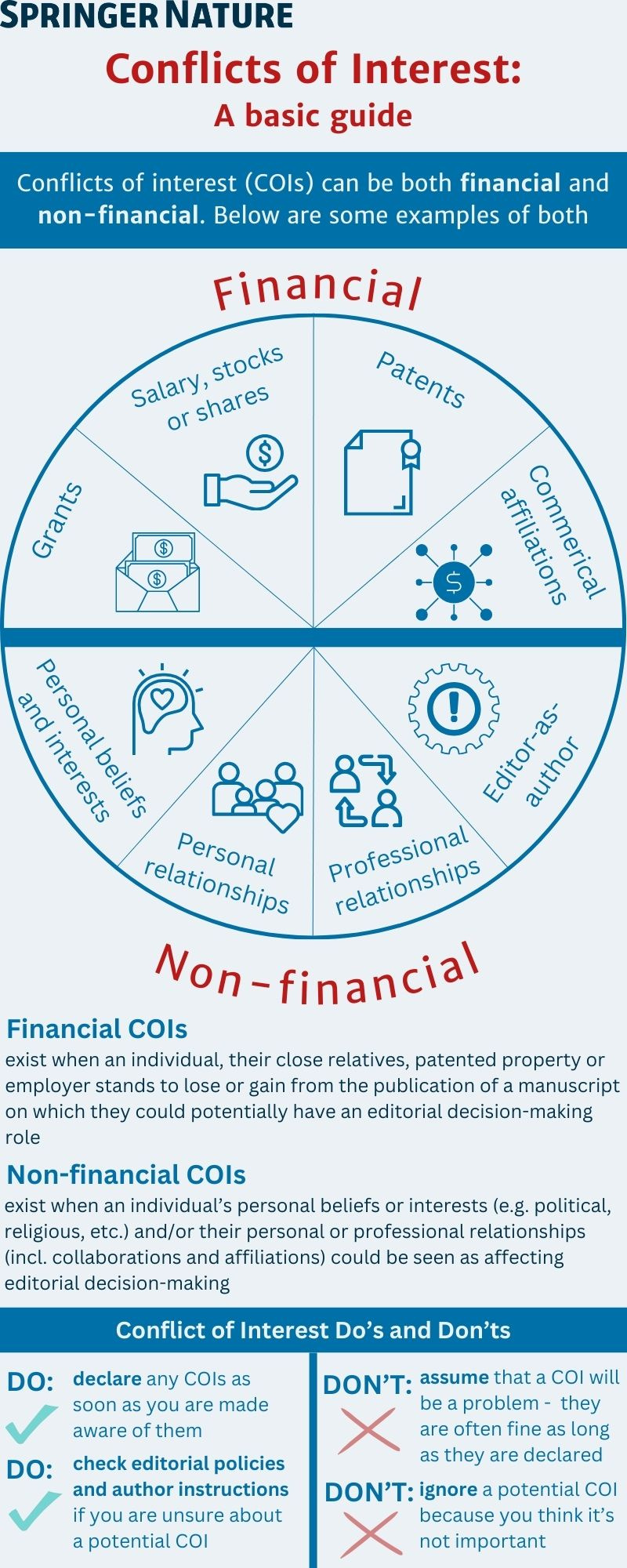Researcher Riddle: Conflicts of interest
Published in Healthcare & Nursing, Astronomy, and Social Sciences

Conflicts of interest (COIs, also known as competing interests) can exist for anyone involved in the creation, assessment or processing of a manuscript including reviewers, editors, journal staff - and researchers! In fact, conflicts of interest are extremely common for authors such as yourself - you may hold patents, own company shares, hold strong personal opinions or work closely with others in the field you are publishing in. All of these examples constitute a financial or personal situation that affects, or could be perceived to affect, your work - and thus, constitute a COI.
Springer Nature policy is clear - for both books and journals, COIs should be declared clearly and openly in your manuscript on submission, before the assessment process begins. This allows for them to be taken into account by everyone considering the work, and factored into editorial decisions.
Conflicts of interest can be financial - such as being employed by, or receiving grants or other funding from companies or institutions with a vested interest in your work, holding a patent on a central piece of technology discussed in your manuscript, or any related stock or share ownership. COIs may also be non-financial, such as personal or professional relationships that may be perceived as relevant to the work in your manuscript, being an Editorial Board member on the journal you are submitting to, holding personal beliefs that may influence your manuscript and more.
Problems can arise when COIs are uncovered at a late stage of the assessment process, or even after publication. Failing to disclose a COI can be unintentional, and due to a misunderstanding of what constitutes competing interests. To test your knowledge and help prevent any tricky situations from arising, try your hand at the following question:
Which of the following are conflicts of interest that should be declared before submission? Select all that apply
A: You have submitted a patent for your work
B: You have presented a poster at a conference in the field on the same topic
C: Your cousin works in the same field as you
D: You are a member of the Editorial Board for the journal you are submitting to
E: You received a grant from a commercial company for equipment for your work
F: Your university holds a patent for a key piece of technology discussed in your work
G: Your work disproves a popular theory in the field and you know some researchers will not be happy

The correct answers are A, D, E, and F!
- Applying for a patent, being on the Editorial Board of the journal you are submitting to, or receiving commercial funding for your work are all potential conflicts of interest that should be declared.
- Your institution holding a patent for something related to your work may constitute a potential conflict of interest if the work could be seen as having a significant effect on the value of the patent.
It is important to remember that COIs are not inherently negative. Declaring a competing interest does not mean your manuscript will not be considered - in fact, it is the best way of ensuring that informed editorial decisions will be made. By declaring COIs, you can avoid situations in which decisions have to be questioned, investigated or even overturned.
Depending on the exact combination of circumstances, outcomes of undisclosed COIs can range from no impact through to a correction being published, an editorial note being issued, or potentially even in the work being retracted. The best way to avoid these unwanted situations is to be proactive and transparent about COIs when submitting your manuscript. Open and honest declarations ensure that any potential biases are acknowledged and allow reviewers and editors to make informed decisions. This ultimately safeguards the credibility of your work and the integrity of the scholarly record.
Springer Nature has the following resources to help researchers with assessing potential conflicts of interest:
- Editorial Policies: The overarching Springer Nature editorial policy on competing interests is a helpful place to start to familiarize yourself on competing interests. The site links out to specific publications, such as BMC, Nature, Springer and Palgrave Macmillan.
- Other policies: Peer reviewer policies touch on conflicts of interest regarding author-suggested peer reviewers - an example of this is Springer’s peer review policy.
- The Introduction to Research Integrity course features a lesson dedicated to competing interests.
- The following infographic is a useful tool compiling all things Conflict of Interest in one easy-to-read resource! You can save it to your computer by right-clicking and selecting "Save as image" from the drop-down menu:


Please sign in or register for FREE
If you are a registered user on Research Communities by Springer Nature, please sign in